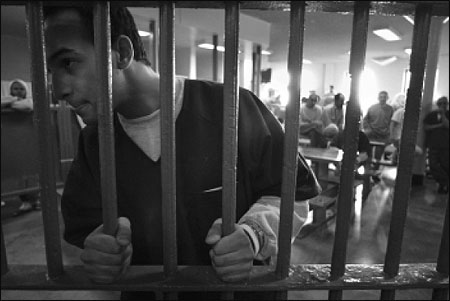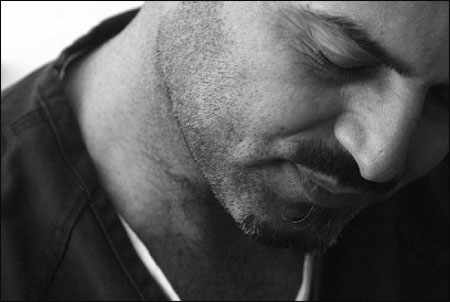
Immigration and Naturalization Service detainee Issam Sadak, 22, from Morocco, lived in Manhattan before the September 11 attacks on the World Trade Center. He now lives at the Passaic County Jail and had been there for a month after he was detained because his tourist visa had expired. Photo by Ryan Mercer/Herald News.
Tokmak Lokman, a 30-year-old Turk, spent nearly nine months in a Paterson, New Jersey jail, even though he had neither committed a crime nor violated immigration laws. Lokman had a pending political asylum claim when he was arrested at the Long Island gas station where he worked. FBI and immigration agents who were investigating another Turkish national did not believe him when he said he didn’t know the man. So, he says, he was arrested. In late June, he was finally deported.
Lokman was one of about 1,200 immigrants caught up in the government’s terror investigation since September 11, 2001. Although he was jailed just minutes away from the Herald News newsroom in West Paterson, getting to him to tell his story was a challenge.
Many Immigration and Naturalization Service (INS) detainees were designated of “special interest” to the FBI because they were being investigated for possible terrorist ties. In the name of national security, the government has kept their names secret and held secret immigration hearings. Because many of these detainees didn’t have lawyers, immigrant advocates and attorneys worried that they had not been informed of their legal rights. They were jailed on minor immigration violations, such as visa overstays, that the INS did not even pursue prior to September 11. Immigration judges often denied their requests for release on bond, or set bond at an unusually high amount. At least three dozen immigrants were jailed for 28 days or more without being charged with any crime or immigration violation, according to Amnesty International. Some detainees languished in jail for months after receiving deportation or “voluntary departure” orders because they hadn’t received final clearance from the FBI.
Telling the Stories of ‘Special Interest’ Detainees
At the Herald News, we knew we had to tell these stories. Members of our local Arab community were being questioned, arrested and detained. We also knew we had to challenge the government’s blanket secrecy. With the help of attorneys, advocates and family members, I was able to report the stories of nine special interest detainees, several of whom I interviewed directly. Our projects editor, Janon Fisher, interviewed Lokman and others after his phone number in the newsroom circulated through the INS jail dorms in Paterson. But he received less help than I did from the attorneys and advocates he worked with, some of whom refused to reveal the names of longtime detainees for privacy reasons. Several lawyers denied him permission to publicize their clients’ cases, citing general concerns about retribution from the INS. Fisher believes their reticence fed into the government’s obfuscation.
When terrorists attacked the World Trade Center, we knew that people in our coverage area would be directly affected. After all, Paterson is just 15 miles west of Manhattan over the George Washington Bridge. But we didn’t foresee that the Passaic County Jail in Paterson, which stretches the span of a scraggly urban block, would become one of the most important holding stations for special interest detainees.
As the paper’s immigration reporter, I began covering the story before its local relevance became clear. In early October 2001, I spent two days in Newark’s immigration court, which is part of the U.S. Department of Justice. Armed guards lined the hallways. Shackled, special interest detainees were brought up one by one. The court docket, which is posted publicly, did not include their names. In a directive written on September 21, 2001, U.S. Chief Immigration Judge Michael J. Creppy had ordered judges to close all proceedings involving special interest cases to the press and public, including family members and friends. He further ordered court administrators to neither confirm nor deny information about the hearings.
During my two days at the immigration court, I didn’t even try to enter a courtroom. However, through conversations with attorneys, family members, and an interpreter, I realized that Arabs were being rounded up as part of the September 11 investigation. Most special interest detainees were Arab, South Asian, or Turkish men, Justice Department figures show.
The first special interest detainee I interviewed was Mohammad al-Raqqad, a 37-year-old Jordanian who was arrested on September 13, 2001. Through his lawyer, I asked him to call me collect from jail. Raqqad was eager to find anyone who could help him get back to his wife and children in Jordan. An immigration judge had granted him a “voluntary departure” order, allowing him to fly home at his own expense. But he hadn’t received final clearance from the FBI, so he was stuck in jail. “They finish the investigation with me. Why [do] they hold me in the jail?” Raqqad asked in mid-November, two months prior to his release. We published a profile of Raqqad, explaining his frustration at his seemingly indefinite jail stay and conveying that, despite his experience, he still wanted to move his family to the United States some day.
Raqqad called me again when he and six other INS detainees staged a hunger strike to protest their departure delays. All seven hunger strikers were Muslim. We wrote about their protest, and as Raqqad’s detention wore on, I mentioned his plight in other INSrelated articles. Twice the INS denied my request to personally interview him. By the time the agency granted me permission, he had been told he would fly home in a few days. When he got to Jordan, Raqqad called to thank me for publicizing his case. He also made his wife, whose English was limited, thank me over the phone.
The only lengthy face-to-face interview I did with a special interest detainee was with Nael al-Fawair, a 36-year-old Jordanian who had been transferred to INS custody after a traffic stop. Fawair was married to a U.S. citizen, but had been deported before. The INS allowed a photographer and me to meet with Fawair in a designated, nondescript room. An INS spokesman asked us not to take any pictures of the detainees behind bars. Fawair was angry that he had been in jail for nearly three months after agreeing to deportation, which he claimed he was coerced to do. He said that FBI agents did not question him once during his detention.

Nael al-Fawair, a Jordanian national, says he came to America because he believed he would be living in a free democratic society. After spending months in the Hudson County Correctional Center in Kearny, he says he wants to go back to Jordan and never return because his faith in the U.S. government to protect his rights has completely vanished. Photo by Ryan Mercer/Herald News.
This Reporter Joins a Lawsuit
RELATED ARTICLE
"'Freedom of the Press Becomes a River Without Water'"
- Herschel P. FinkIn late January, the American Civil Liberties Union (ACLU) of New Jersey sued Hudson and Passaic counties in state court for keeping the names of INS detainees secret. The company that owns our newspaper, North Jersey Media Group, filed an amicus brief in the case. About this same time, the ACLU, four Michigan papers and Rep. John Conyers filed suit in federal court in Detroit; in that case, the plaintiffs challenged the government’s efforts to keep secret the deportation hearings of Rabih Haddad, a cofounder of an Islamic charity that the government shut down in December 2001. An ACLU official asked me if the Herald News would be willing to help mount a similar challenge in New Jersey. Our company was willing. But I needed to document my thwarted attempts to attend special interest hearings.
An immigration attorney advised me of the case of Raza Ahmed, a 42-year-old Pakistani man who was being held in the Paterson jail. When I asked the day before Ahmed’s hearing which judge would be hearing it and when, the court administrator said she was not allowed to tell me. The following day, on February 14, another Herald News reporter and I tried to attend Ahmed’s hearing. The immigration judge said the hearing was closed in accordance with instructions from top Justice Department officials. One week later, I was barred from observing the immigration hearing of Malek Zeidan, a 41-year-old Syrian national who had overstayed his visa. The immigration judge cited the September 21 Creppy directive.
Within two weeks, the ACLU-N.J. filed suit in U.S. District Court in Newark on behalf of North Jersey Media Group and the New Jersey Law Journal, arguing that blanket closure of special interest hearings violated the public’s First Amendment right to open proceedings. The judge ruled this policy unconstitutional in May.
He also ordered the government to stop enforcing the Creppy directive nationwide while the case was appealed. Justice Department lawyers sought to have the order stayed, so that hearings could remain closed while they appealed to the U.S. Court of Appeals for the Third Circuit in Philadelphia. The Third Circuit denied the government’s request for a stay, but on June 28, the U.S. Supreme Court granted the stay, without explanation.
Later in the summer, in the case stemming from Haddad’s closed hearings, three judges from the Sixth Circuit Court of Appeals in Cincinnati ruled unanimously that categorical closure of such hearings threatened democracy. Soon after, in our case, a two-to-one ruling by the Third Circuit found in the government’s favor, concluding that national security concerns override the public’s right to open hearings. The ACLU is considering an appeal of this decision to the full Third Circuit or to the U.S. Supreme Court directly.
The importance of subjecting the government’s anti-terrorism strategy to public scrutiny was evidenced in the case of Malek Zeidan. Federal agents “discovered” Zeidan when they went looking for his former roommate. He became a special interest detainee and was cleared of suspicion only after he challenged his closed immigration hearings in federal court. With two lawyers and ample press coverage, Zeidan spent a mere six weeks in jail before being released on $10,000 bond. Without the help of aggressive attorneys and probing reporters, Zeidan might very well have spent months locked up—and no one, save his jailers, would have known.
Until early October, Hilary Burke covered immigration for the Herald News, a 38,500-circulation daily newspaper based in West Paterson, New Jersey. She has since moved to South America to work as a freelance journalist. To track developments in the North Jersey Media Group, et al. v. Ashcroft, et al., visit www.aclu-nj.org.



